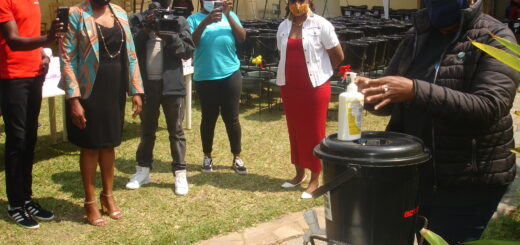When all rise against, who will save The Newspaper?
Notice: Undefined index: catFilterList in /home/zambi/public_html/wp-content/plugins/wp-likes/api.php on line 243
By Victor Lwabila Freelance Investigative Journalist Lusaka, Zambia From: victorlwabila26@gmail.com To: LFleeson@msn.com Date: 17/02/2018
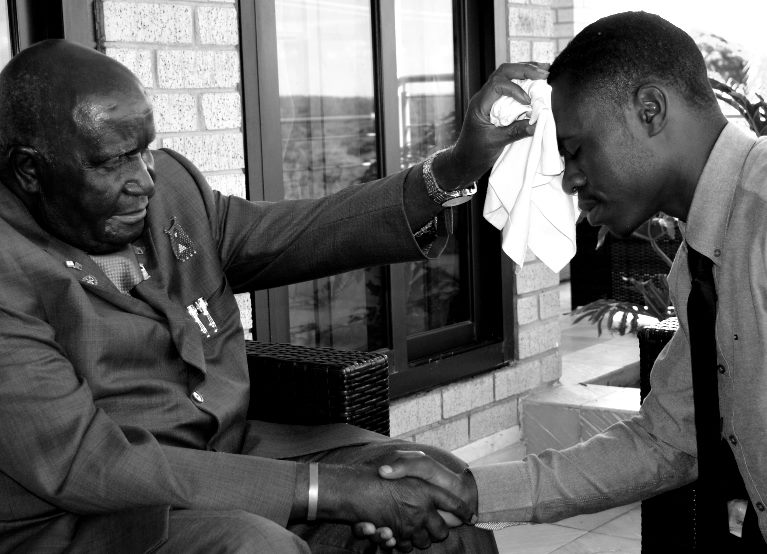
Victor Lwabila with Zammbia’s forer First Repblican President Dr Kenneth David Kanda
THE decline of newspapers has widely been debated, as the industry has faced dropping newsprint prices, slumping ad sales, the loss of classified advertising and precipitous drops in circulation.
However, the case in Zambia is much more complex. Not so long ago, investigations were conducted on the hypothesis that digital communication technologies were affecting print newspapers’ productivity.
Surprisingly, the investigation turned out to have unearthed more serious threats to the practice than to the production process itself.
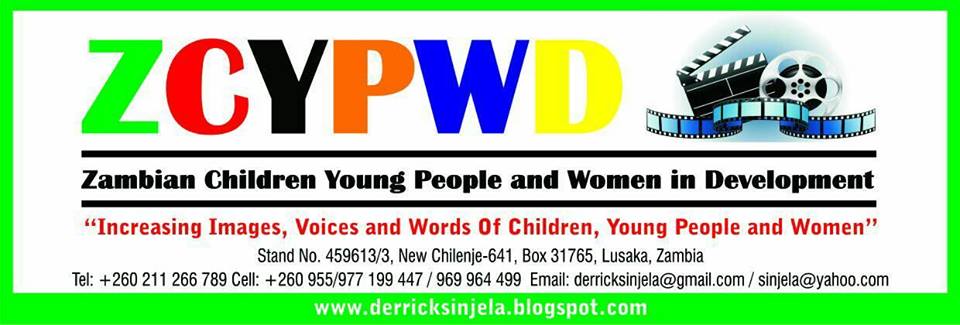
Zambian Children Youung People and Women in Development ZCYPWD logo
It is an undeniable fact that digital communication technologies such as the new media have largely affected mainstream communications especially the print newspaper, but we are now prompted to look at a bigger picture where less access to information, denial of press freedom, lack of a strong national reading culture, imbalanced readership patterns, lack of professionalism and the high cost of the newspaper cover price are a major cause to the decline of this form of media.
Following reported violations on the press in Zambia that have included the closing of a newspaper and two radio stations, an interview was conducted with Beenwell Mwale a Zambian media professional and Head of the Media Studies department at Cavendish University Zambia to detail the situation.
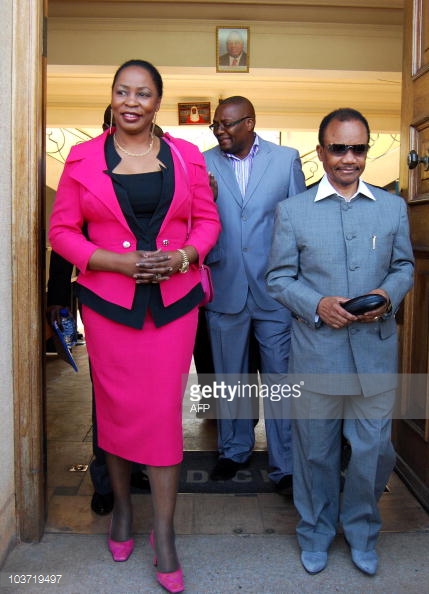
Late Dr. Frederick Jacob Titus Chiluba with wife Regina and Zambia’s High Commissioner to South Africa H.E. Emmanuel Mwamba
He quickly highlighted that Zambia is home to a plural media since the reintroduction of a political multiparty system in 1991 when veteran trade unionist Fredrick Jacob Titus Chiluba’s Movement for Multiparty Democracy (MMD) ousted the liberation leader Kenneth David Buchizya Kaunda’s United National Independence Party (UNIP).
Explaining recent violations of the press in Zambia, Beenwell analysed that the Post newspaper had been facing severe harassment.
“The Post newspaper, a forerunner to the Weekly Post, was one of the first independent newspapers and continued to champion democracy and good governance by holding government accountable.
Incidentally, the harassment of The Post newspaper started way back but the previous leaders between 1990 and 2008 – Kaunda, Chiluba and Levy Mwanawasa were tolerant of it.”
In a monitored interview by CIVICUS, a World Alliance for Citizen Participation, Wilson Pondamali a Zambian freelance investigative journalist and media activist added that Mwanawasa succeeded Chiluba in 2001 but died in office in 2008, being succeeded by Rupiah Banda who was later defeated by Michael Sata of the Patriotic Front (PF) in 2011.
“The suffocation of The Post newspaper which manifested in 2016 during the reign of Michael Chilufya Sata’s successor and incumbent Edgar Lungu could have started under President Banda apparently because the tabloid showed open support for Sata from the first day Banda was nominated to contest the 2008 election, in which he narrowly defeated Sata.”

Victor Lwabila
Freelance Investigative Journalist
Lusaka, Zambia
From: victorlwabila26@gmail.com To: LFleeson@msn.com
Date: 17/02/2018
Speculations reveal that Banda was still vindictive of The Post and wanted it closed as evidenced by his threatening statement made when he was still in office.
Wilson charged that The Post newspaper continued to be critical in the three-year reign of Banda while projecting Sata in the limelight. “It is undisputable that the tabloid played a pivotal role in the PF’s 2011 victory. This can be supported by the large number of its staff who were offered jobs in the civil service thereafter.
The managing editor, and Editor in Chief Dr. Fred Namakando M’membe’s right hand man Amos Malupenga, was appointed as permanent secretary, while M’membe’s deputy Sam Mujuda was appointed into foreign service as high commissioner.

Fred-Mmembe-and-Mutinta-Mazoka-Picture-by-Chanda-Mwenya-Zambia-Daily-Mail
The news editor George Chellah became press aide at State house while many other journalists were appointed press attaches to Zambia’s foreign missions.”
He further narrated that Sata died after only three years in office and was succeeded by Edgar Chagwa Lungu in a tight 2015 election, defeating closest rival UPND’s Hakainde Hichilema mainly with support from former President Banda.
 Lungu himself received fair criticism from The Post during and before the 2015 and 2016 elections.
Lungu himself received fair criticism from The Post during and before the 2015 and 2016 elections.
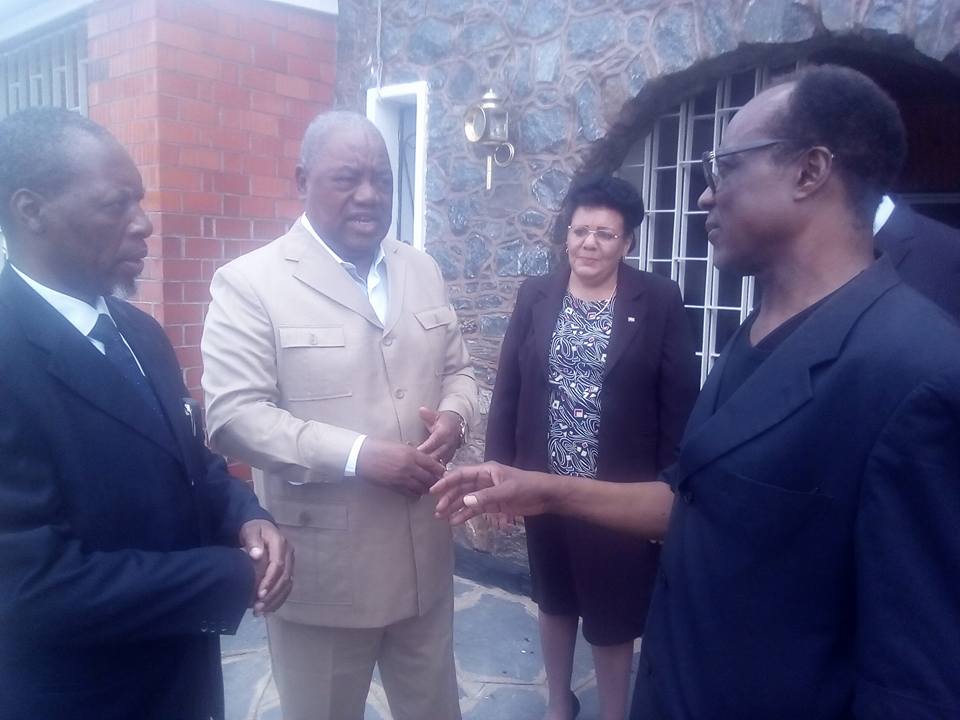
Former Fourth Republican President Rupiah Bwezani Banda, Cuban Ambassador to Zambian, Malawi and COMESA, Ambassador Caridad Perez Gonzalez, Zambia-Cuba Friendship Association Acting President, Tentani Mwanzah and and Adminstrative Assistant Chibeza Mfune after signing a Book of Condolences in honour of departed Cuban Revolutionart Fidel Castro Ruz at the Cuban Embassy in Lusaka’s Kalundu residential area, last year picture by Derrick Sinjela
“Being a close ally of Lungu, the newspaper company was now being pursued over a disputed tax claim by the Zambia Revenue Authority, leading to the tax authority threatening to seize the company’s fleet of vehicles and the premises on 21 June 2016 leaving the newspapers’ workers and owners to operate outside.”
But then that was not enough, in an interview, one former employee hinted that some workers who claimed not to have been paid applied to the High court to have the newspaper liquidated and a long-time foe of M’membe, Lusaka lawyer Lewis Mosho was appointed liquidator on 1st September 2016. Mosho, of Lewis Nathan and Partners immediately after assuming the liquidator role ‘fired’ M’membe and lawyers Mutembo and Nchima Nchito.

Mutembo Nchinto
After The Post was closed down, the only media that remained as the
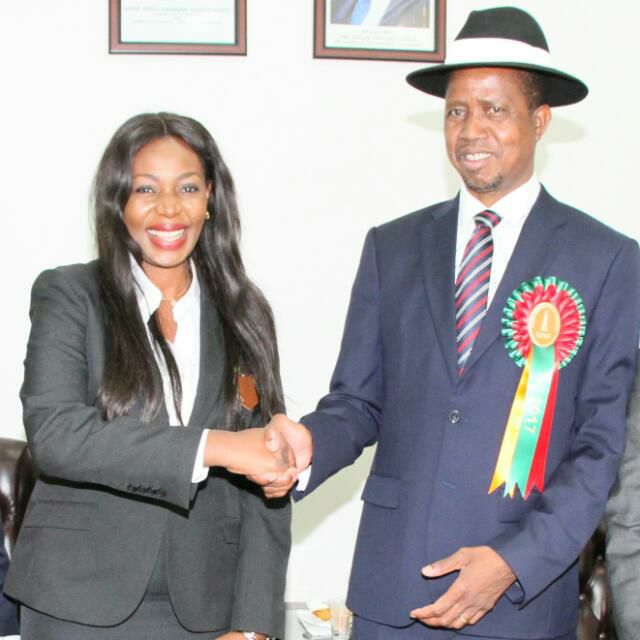
Ntalasha Mutale with President Edgar Chagwa Lungu at the 2017 Trade Fair in Ndola
strongest force was the privately owned Muvi TV with its sister company Komboni radio, both based in Lusaka but broadcasting to many parts of the country.
In another view, the then Information and Broadcasting Services Minister Hon. Chishimba Kambwili, serving as Patriotic Front (PF) Roan Member of Parliament (MP) in Luanshya, Copperbelt Province argued in a phone interview that political inclinations usually compromise professional media coverage.
“What is important is for the newspapers to be ethical and report news that is worth reading and also do vigorous marketing of their newspapers. If you have observed, most of the stories that go on the internet publications is the news that is gotten from the circular newspapers. So, the main source of information actually comes from the daily newspapers and there’s no way in my view that internet news can overshadow the regular daily newspapers.” This was a call for objectivity.
Had The Post maintained a neutral, objective and impartial position, they would still be in existence today. In resolving this, there is need for a firm media rights activism in the nation, which must be backed by legal instruments to ensure journalists are protected from both economic and professional manipulation.
Most private media houses are paying about K1, 000 representing US$100 per month salaries and this exposes journalists to temptations of unethical conduct.
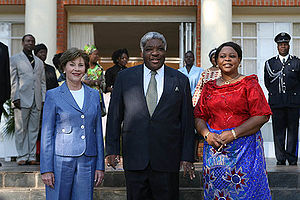
300px-Laura_Bush_with_Zambian_President_Levy_Mwanawasa_and_First_Lady_Maureen_Mwanawasa
But in an unexpected swift turn of events, Zambia’s cholera crisis which started in October 2017 continues to affect the lives of people in the southern African country. Authorities had said the number of persons infected continued to rise – they put the figure at 2,451 as at Sunday January 7, 2018.
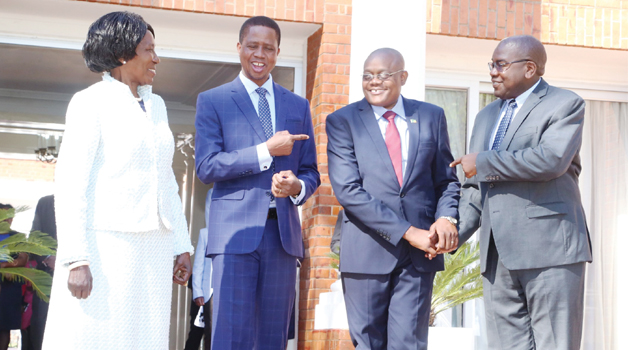
Vice-President Inonge Mutukwa-Wina, President Edgar Chagwa Lungu, Dr. Kennedy Malama and Health Minister Dr. Chitalu Chilufya
A local news portal said of the 61 deaths nationwide, 58 were in the capital, Lusaka.
Areas affected by the crisis included places of worship consequently announcing cancellation of all church services especially in Lusaka. The education sector was the first to be hit as the 2018 school calendar was postponed in order to curtail the incidence of the disease spreading. According to a joint statement by Minister of Health Chitalu Chilufya and his education counterpart Dennis Wanchinga, the re-opening of schools countrywide had been deferred until further notice. “We have had an outbreak of cholera from October 6, 2017 and it has affected mainly Lusaka Province and we have recorded sporadic cases in various parts of the country,” said Dr Chilufya.
President Edgar Lungu had tasked the army to move in to arrest the situation. He said the Zambia Defence Forces were to work with relevant ministries and agencies in the cholera combat. The spread had since been steadily rising. “I have directed all the three wings of the Defence Force to join the Ministry of Health and the city fathers, Lusaka City Council to escalate efforts to minimise the spread of cholera in our capital city and the rest of the country,” he said in December 2017.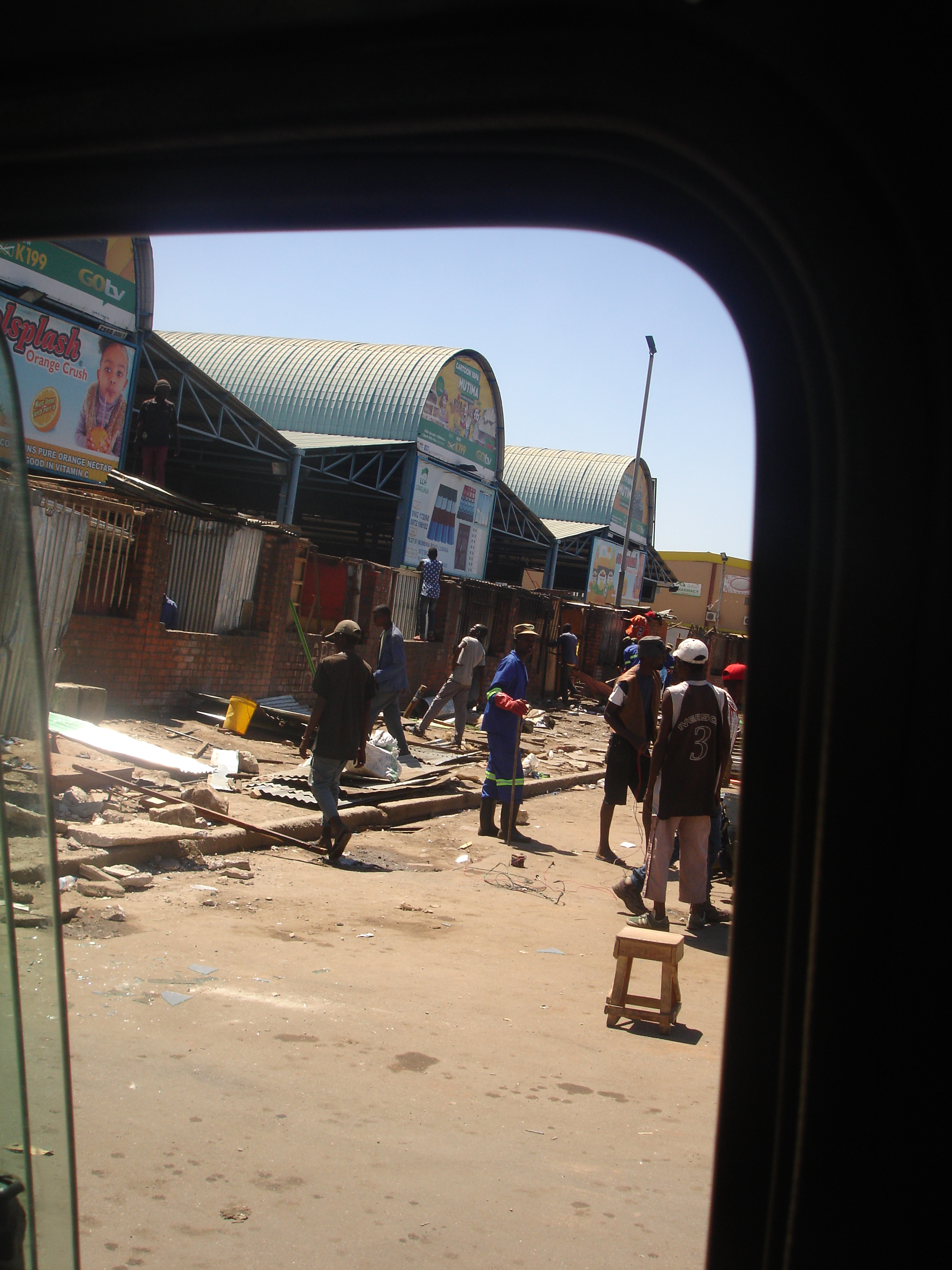
Lusaka’s Lumumba Road during clean up – Picture, Lusaka Times.com
Since then, the defence forces driven clean-up exercise of Lusaka city has opened newer possibilities for the citizens of the country’s garbage ridden city.
Before this exercise citizens have lived with the illusion that nothing could be done to clean up the city and given it the garden city touch. It had become customary for citizens to throw litter about, with cholera almost becoming an annually acceptable occurrence.
Just 48 hours of the defence forces taking over the streets, Lusaka has apart from the poor drainage system, looked almost as clean a city as any well-meaning citizen would love to see.
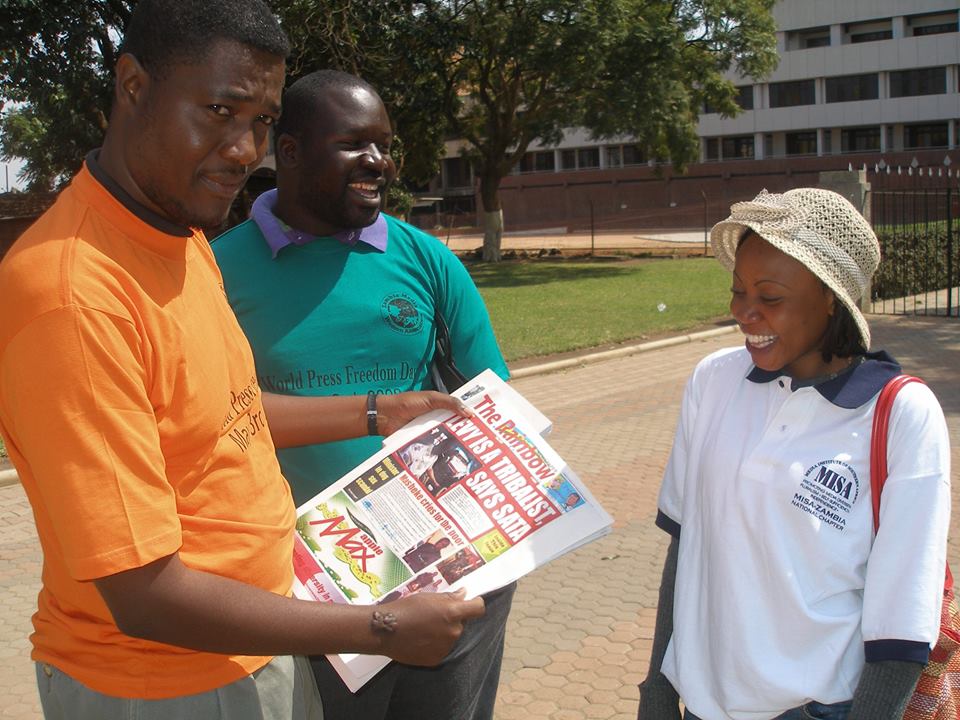
MISA Zambia Executive Director Sipo Kapumba with late scribe Florics Kasumbalesa and Grace Zulu pix by Derrick Sinjela
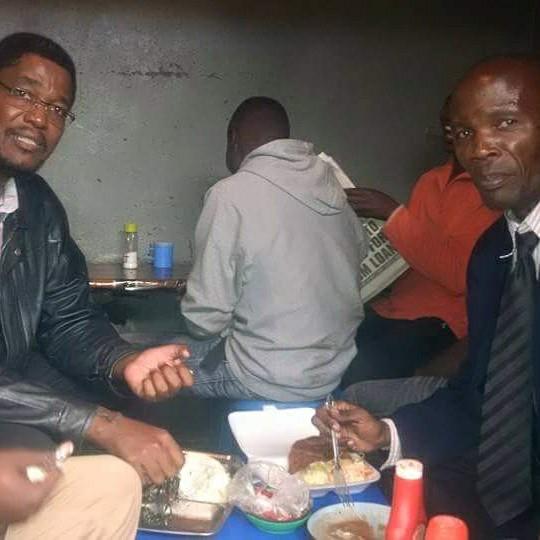
With Sipo Kapumba, Fullman James Mukobeko Nico and The Post
The streets have been ridden of the irksome presence of vendors that have previously resisted being confined to the markets. The little effort by the council to sweep the streets has shown bits of its beauty with a wash of fresh air.
On the contrary, this exercise came as a huge blow to the newspaper industry as its vendors were completely evicted from their various selling points along the streets with no hopes of seeing them back causing a drastic drop in newspaper circulation, sales and readership within Lusaka and surrounding areas.
As this may not be enough, the country has a weak national reading culture. Press Reference.com reveals that literacy in Zambia is about 78 percent among the adult population, and primary education is free and compulsory.
In 1995 there were more than 1.5 million children in 3,883 primary schools; 199,081 students in 480 secondary schools; 3,313 students in 12 technical and vocational schools; 4,669 students in 14 teacher training institutions; and 5,891 students in two universities with middle class citizens living on an average annual income of US$300.
Literacy affects newspaper readership.
The more educated members of the population are more likely to read newspapers.
Readership is also affected by the fact that when families need to decide whether to buy newspapers or food, they are more likely to opt for food, which is quite common in Third World countries like Zambia.
Zambia now has four major newspapers: the state-owned Zambia Daily Mail (ZDM) and the Times of Zambia (ToZ); The Richard Sakala owned and controlled independent Daily Nation; and the critical Mast newspaper owned by Fred’s wife Mutinta Mazoka M’membe, a daughter to UPND founder, the late Anderson Kambela Mazoka.

Fred-Mmembe-and-Mutinta-Mazoka-Picture-by-Chanda-Mwenya-Zambia-Daily-Mail

Mazoka family
All are published in English and have circulations in the 25,000 to 50,000 range. Each paper also has taken advantage of technology by also publishing an online edition.
The percentage of Zambians getting news from the internet grew rapidly in the late 1990s. In 2002 some two thirds of adult Zambians were getting news online.
Roughly, one fourth of all Zambians get news from the internet on an average day. Findings reveal to us that in developing economies like Zambia, it is not the advancement of technology but the high cost of the printed newspaper that puts it on the verge of collapse.
State owned: Zambia Daily Mail selling at K10.00 in 2017
Now defunct: The Post selling at K3.00 in 2014
These developments have led some media experts to predict the printed newspaper will give way to fully electronic information services in the early decades of the 21st century.

ZDM Managing Director Nebat Mbewe with wife Mary Mbewe now at Daily Nation
The Zambia Daily Mail Managing Director Nebet Mbewe also wormed in saying, “The Zambia Daily Mail is definitely affected by the advent of online media or the internet”. Adding that, “this is reflected by the number of copies we’ve been publishing in the past before the internet came online and what our numbers are with more people having access to online news, information and entertainment.
In terms of pricing of the paper, the biggest cost in our production is the newsprint which is imported and whenever there are fluctuations on the exchange rate then the cost of production goes up.”
He further detailed that, “the other major inputs in our production are the plates and the inks; all these material are imported and so this adversely affects our cost of production and inevitably we have to increase the cover price.”
The print media has not always had a happy existence in Zambia.
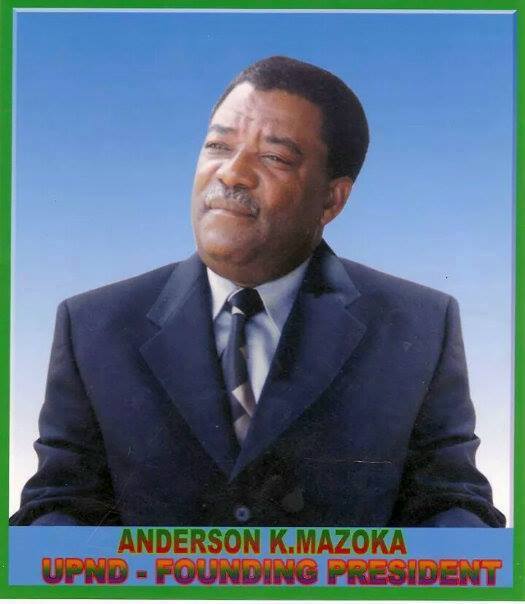
Founding UPND President Anderson Kambela Mazoka
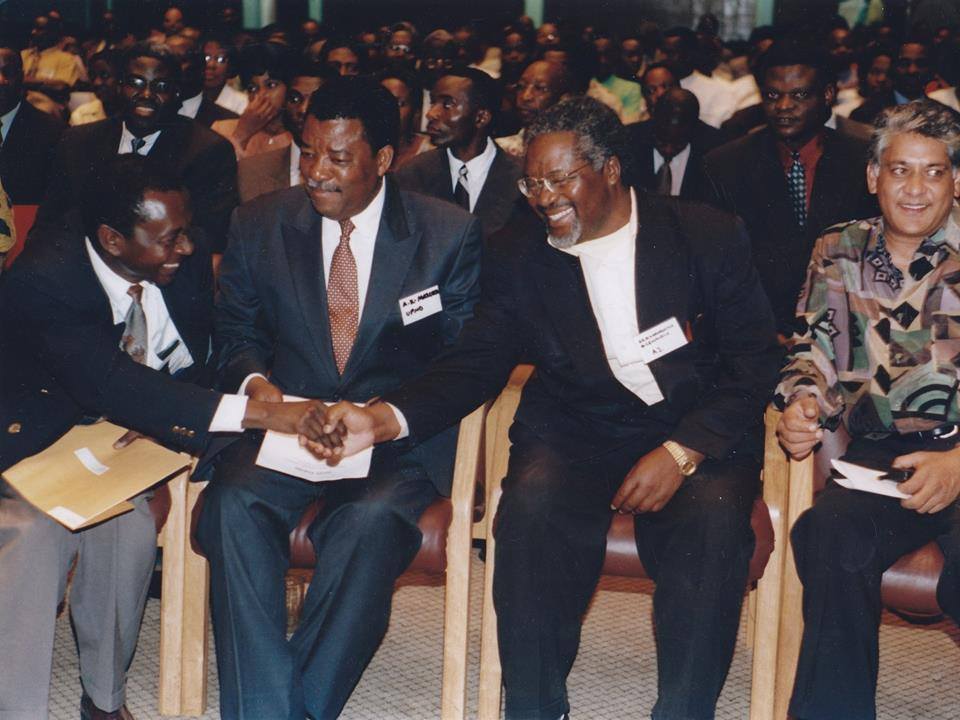
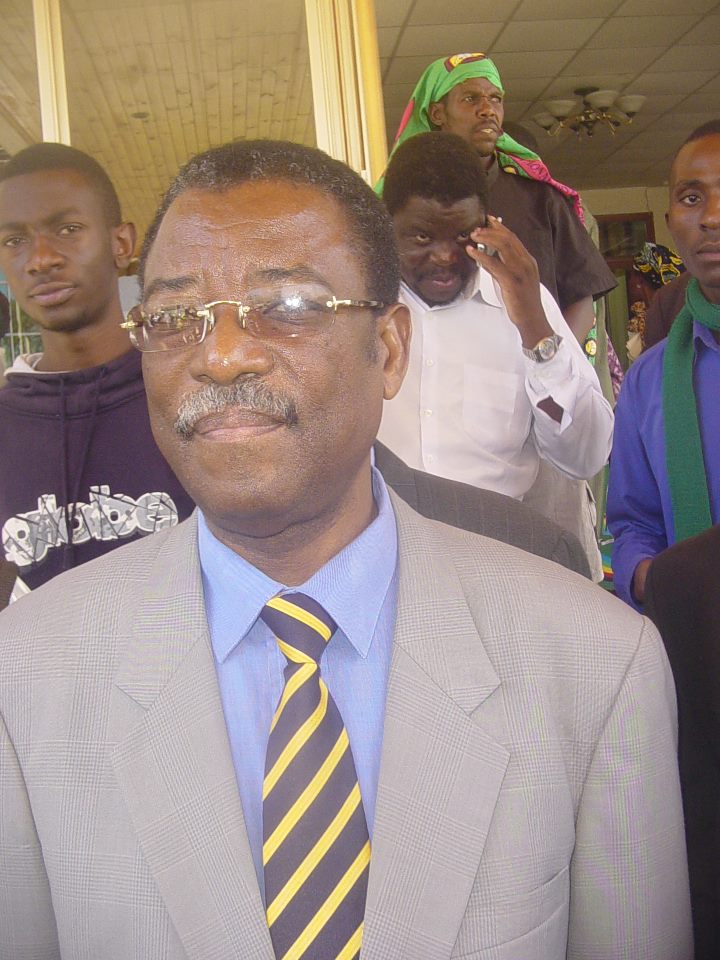 However, their survival is particularly important as they are an integral part of society. Although far from being totally free, the media in Zambia has been far freer than it is in other parts of the world.
However, their survival is particularly important as they are an integral part of society. Although far from being totally free, the media in Zambia has been far freer than it is in other parts of the world.
Despite the absence of freedoms like the access to information, today Zambians now have access to competing and opposing voices.
The private press has taken upon itself the role of public watchdog and defender of freedom and the truth. Access to the media has improved markedly. Criticism of the government is almost not a crime. As much as we have these newfound freedoms, access to the media remains limited because of illiteracy, poverty, inability to afford newspapers, and the costs of electronic media. Moreover, the lack of electricity has kept the electronic media out of the reach of a majority of Zambia’s citizens.
The Information Revolution has made the Internet available in Zambia. Poverty, however, has militated against making e-mail and other Internet services available to most Zambians. Computers, simply, are too expensive. Internet sites and cafes are available, but most Zambians cannot afford to log on and off. Many prefer to spend their limited cash on more pressing needs, such as food.

Rainbow Newspaper Zambia Lloyd Mulenga Kaziya
But then, the big question still strikes; when all these factors rise against – who will save the newspaper? Loyalty will. Journalist’s first loyalty is to citizens. A commitment to citizens is more than professional egoism. It is the implied covenant between someone producing a work of Journalism and the public that consumes it that the work is honest. In short, loyalty to citizens is the most important asset of any publisher that claims to produce journalism.

Michael Chilufya Sata with Secretary General Wynter Kabimba and Spokesperson Given Lubinda pix by Derrick Sinjela
It is what makes the news content trustworthy. And that, in turn, is what makes the publication’s advertising more credible. It makes e-commerce transactions readers engage in on the site seem safer. It makes the events that generate revenue seem more worth attending.
It also means that any new experiments to make advertising messages more compelling, whether they are called “native advertising” or “sponsored content” or something else, must also be designed in a way that does not undermine the credibility of the news enterprise.
All of this begins with the idea of loyalty to the citizen, to the audience, to the concept that the public is being served rather than exploited or, worse, deceived.



